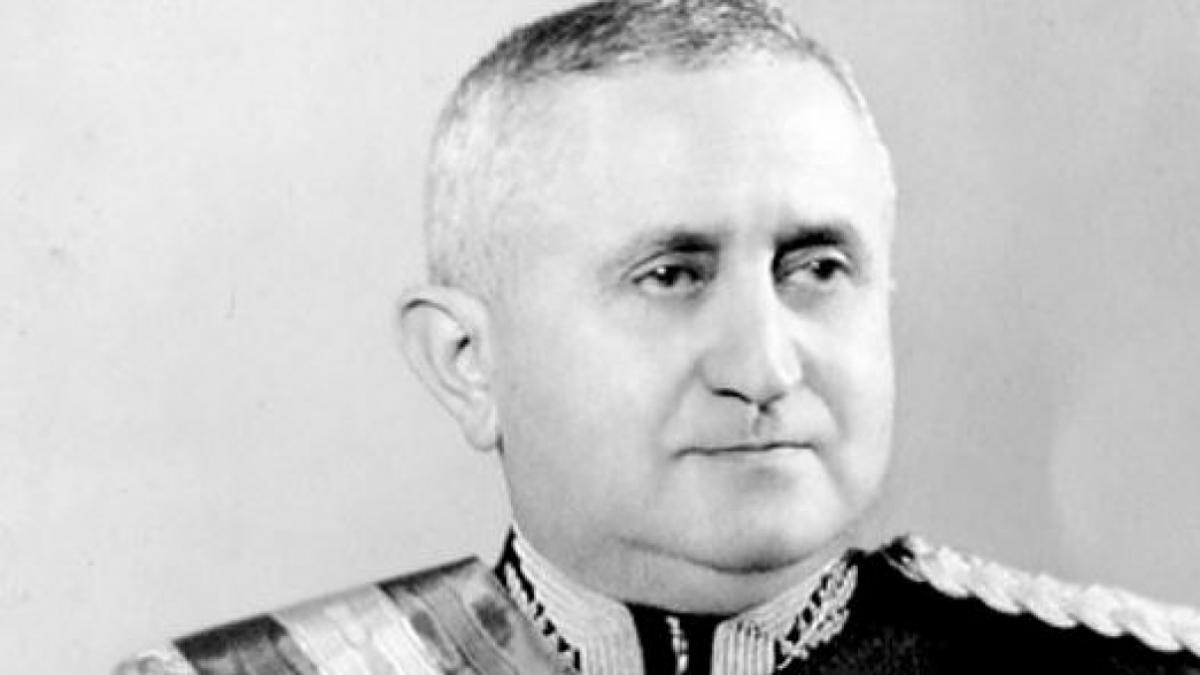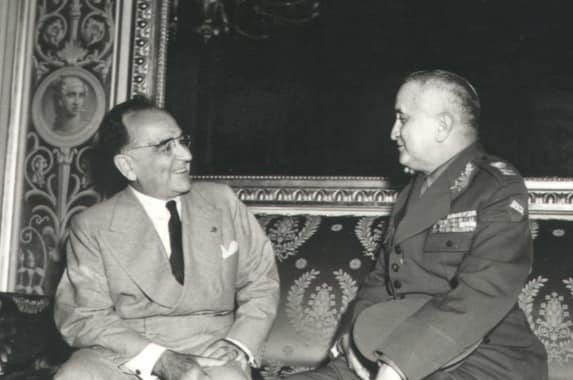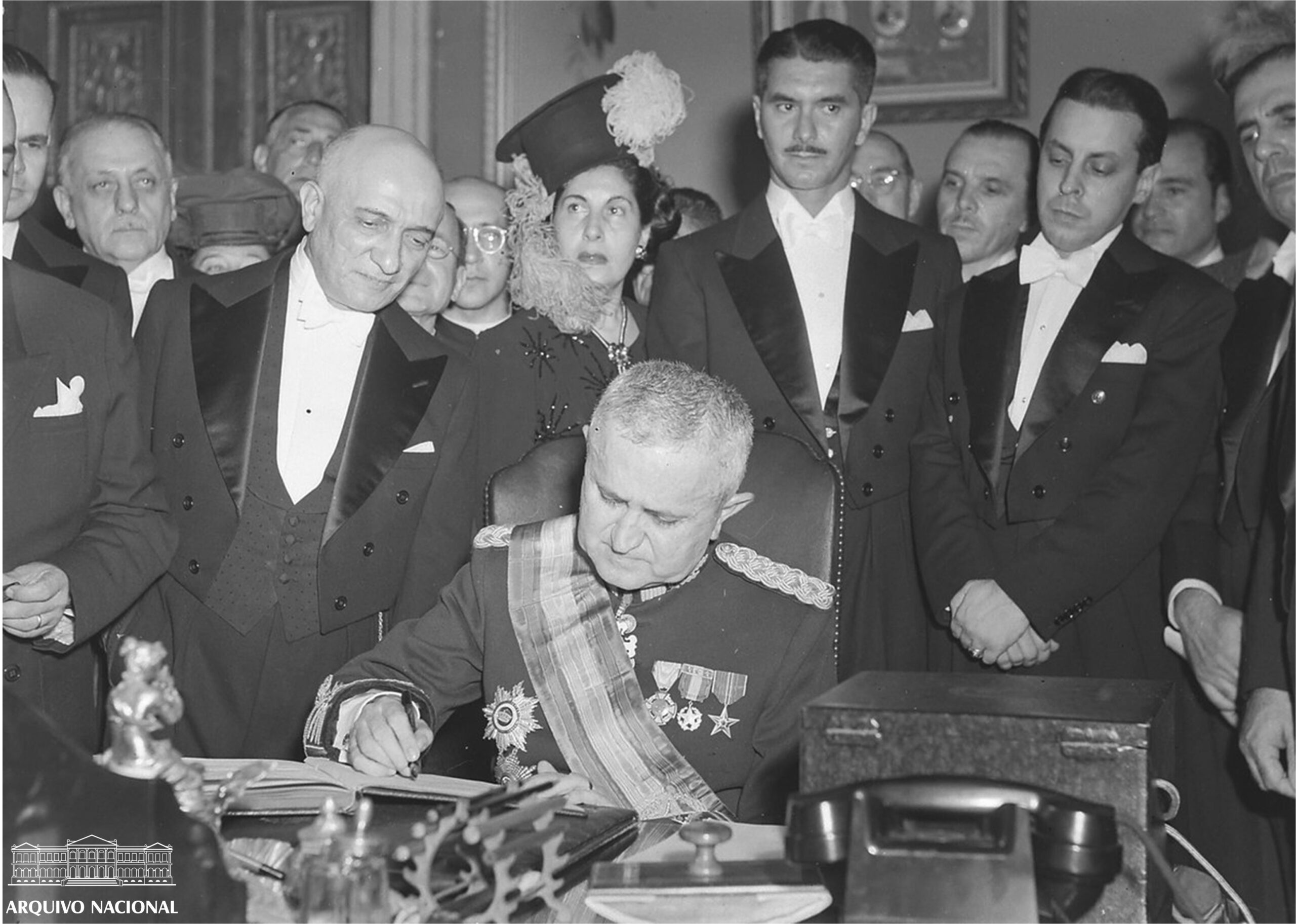Eurico Gaspar Dutra (1883-1974) was a military officer of the Brazilian Army and the 16th President of Brazil from 1946 to 1951. Eurico Gaspar Dutra was born on May 18, 1883, in Cuiabá, the son of José Florêncio Dutra, a modest merchant and a veteran of the Paraguayan War, and Maria Justina Dutra. Gaspar Dutra was married to Carmela Telles Leite Dutra.

In 1903, Dutra entered the Preparatory and Tactical School of Rio Pardo in Rio Grande do Sul. Later, he attended the Military School of Praia Vermelha, where he participated in the Vaccine Revolt, and the War School in Porto Alegre, where he was declared a Cadet Officer in 1908.
In 1912, he graduated from the Army Staff School. He did not participate in the 1930 Revolution; at that time, he was in Rio de Janeiro and adopted an ambiguous stance toward the Revolution.
From May 13, 1935, to December 8, 1936, he commanded the 1st Military Region in Rio de Janeiro. In this role, he led the repression of the Communist Uprising in Rio de Janeiro, Natal, and Recife during Getúlio Vargas’s provisional government, which appointed him Minister of War on December 5, 1936. In this position, Dutra played a decisive role, with Getúlio Vargas and General Góis Monteiro, in the establishment of the Estado Novo on November 10, 1937, and in suppressing the integralist uprisings in 1938. He remained as Minister of War until August 3, 1945, when he left to run for the presidential election that year.
During his term, Dutra sought to reform and expand the Army’s own factories. He completed the installation of an artillery projectile factory in the Andaraí neighborhood in Rio de Janeiro in 1937, as well as the cartridge and artillery fuze factory in Juiz de Fora, Minas Gerais. He also expanded the barrel and sabre factory in Itajubá, Minas Gerais, and the Estrela gunpowder factory in the state of Rio de Janeiro. The issue of dual-base powders used in modern artillery was only resolved with the inauguration of the new Piquete factory in São Paulo in early 1941, but even in 1937, the old facilities were renovated. In the same year, the General Câmara War Arsenal in Rio Grande do Sul was definitively established, and renovations began on the Rio de Janeiro War Arsenal and the Realengo Factory. The construction of the new Ministry of War building, now the headquarters of the 1st Army, in Rio de Janeiro was also started.
Dutra also revamped the military vehicle factory in Curitiba and the gas mask factory in Bonsucesso, Rio de Janeiro. In the following years, private companies were stimulated, with several projects entering the production phase from 1943-1944, including those of Laminação Nacional de Metais S.A. (Madsen machine guns), Companhia Brasileira de Cartuchos (infantry ammunition), Companhia Nacional de Forjagem de Aço Brasileiro (Confab), whose machine shop was imported from the United States with the assistance of the Ministry of War, and D.F. Vasconcelos (binoculars and other optical instruments). In May 1938, Dutra restructured the Ministry of War, concentrating full decision-making power in his hands. The Superior War Council, the General Staff, the military regions, and other agencies were completely subordinated to the minister.

During his long tenure at the Ministry of War, which coincided with the preparation and implementation of the Estado Novo, of which he became the “constable,” as it came to be said in 1945, Dutra also approved several basic laws, such as the Statute of the Military, the new Military Service Law, the Army Organization Law, and the Military Education Law. He created new units and services and built dozens of barracks, seven military hospitals, military villages, worker villages, depots, factories, remount and veterinary services establishments, and railways and roads (in both cases, only in or between the states of Rio Grande do Sul, Paraná, Santa Catarina, and Mato Grosso).
During World War II, he was among the military leaders who were against Brazil aligning with the Allies and a deeper involvement in the conflict. Dutra and Góis Monteiro resisted the breaking of diplomatic relations with Axis countries, arguing that Brazil was not sufficiently prepared militarily to defend its territory. However, on the following day, coinciding with the end of the conference, Brazil broke off diplomatic relations with the three countries. Roosevelt’s commitment gave Vargas the necessary support to overcome the resistance of the top military brass, whose behavior was increasingly influenced not only by international ideological affinities but also internal considerations related to the country’s political future and the role the military corporation was destined to play in it. A comparison between Vargas and Dutra indicates that both were motivated by nationalism, but while Vargas’ nationalism was primarily translated into the struggle for heavy steel production, Dutra’s focused on strengthening military power in the country.
With Brazil’s participation in the war alongside the Allies and growing pressure from civil society for the country’s redemocratization, Dutra formally embraced the idea of ending the regime initiated in 1930. He was expelled from the ministry again on August 3, 1945, and participated in the deposition of Getúlio Vargas in October 1945.
Dutra ran for president as a candidate of the Social Democratic Party (PSD) in coalition with the Brazilian Labour Party (PTB) and won the elections on December 2, 1945, with 3,351,507 votes, defeating Eduardo Gomes of the National Democratic Union and Iedo Fiúza of the Brazilian Communist Party. Nereu Ramos, a politician from Santa Catarina and also from the PSD, was chosen as vice president by the National Constituent Assembly of 1946.
A developmentalist at heart, Eurico Dutra gathered suggestions from various ministries and prioritized four areas: Health, Food, Transportation, and Energy (whose initials form the acronym SALTE). The resources for the SALTE Plan would come from the Federal Revenue and foreign loans. However, resistance from the conservative coalition and the orthodoxy of the economic team ended up making the plan practically non-existent.

During Dutra’s administration, the construction of the Rio de Janeiro-São Paulo highway, BR-2, now the President Dutra Highway, was initiated and inaugurated. He received praise from the press for his road policy. An editorial in the newspaper A Noite stated that this sector presented the most “significant and fruitful” results, with the alleged construction of 500 km of roads during his government.
By the influence of his wife, he created the Carmela Dutra Maternity Hospital in Florianópolis, named after his wife. It was also through the SALTE Plan that Dutra opened the Rio de Janeiro-Bahia highway and established the São Francisco Hydroelectric Company (CHESF).
During his presidency, the National Economic Council, Regional Planning Commissions, and the Federal Appeals Court were established. The Oil Statute was drawn up during his government, which led to the construction of the first refineries and the acquisition of the first oil tankers.
During his government, the federal territories of Ponta Porã and Iguaçu were extinguished. He visited the USA in 1950, becoming the first Brazilian president to do so (Júlio Prestes had visited the USA only as president-elect). One of his most controversial measures was the prohibition of gambling in Brazil on April 30, 1946, which effectively ended the operation of casinos.
On September 18, 1950, TV Tupi, the first television station in Brazil, was inaugurated. Between June 24 and July 16 of that year, Brazil hosted the World Cup, in which the Uruguay team defeated Brazil at the Maracanã Stadium in the final match, becoming world football champions.
He left the presidency in January 1951 but continued to participate in Brazilian politics. In 1964, after the military coup against João Goulart, he attempted to return to the presidency by participating in the presidential election of 1964. However, he was already too distant from the dominant military group and was bypassed in favor of Humberto de Alencar Castelo Branco. He was one of the founders of the National Renewal Alliance in 1966, the party that supported the military dictatorship. He passed away on June 11, 1974, in Rio de Janeiro (formerly the State of Guanabara), at the age of 91.

Matheus Araújo
Matheus is an entrepreneur at Araujo Media, where he serves as CEO and Creative Director. He shares analyses on his personal blog "matheusaraujo.me" and is currently pursuing a degree in Advertising and Propaganda. Moreover, he has a passion for history, particularly that of Brazil, which led him to become the founder and editor of the Brazilian History portal.
